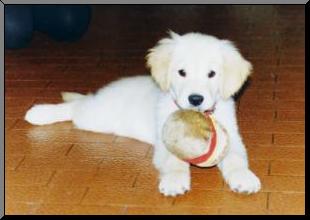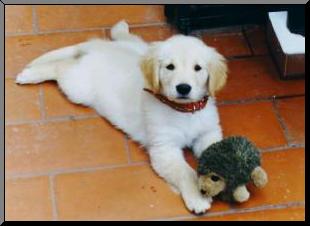THE
PUPPY COMES HOME
Once the breed and breeder are chosen, it'll come the day you'll have to
go to the kennel to meet this four-legged new member of your family. But before
you do that, it would be advisable to prepare the ground to avoid any possible trouble.
A practical way to do this is to have a look at your house, mainly the future
environment of your puppy, and ask yourself " What mischief can he do
here? What can he do there?" To tell you the truth, puppies have a special
tendency to run into trouble, as any baby in fact usually has, and that
tendency may go against their own health and security most of the times. But
don't worry, prevention is the key to happiness. You'd better look at the
environment through puppy's eyes. Typical temptations :pins, nails, little
ornaments, curtains, cushions, chairs, those one-hundred-dollars Reebok you've
just bought, windows, stairs, WIRES, PLUGS... It would be ideal if you could
just place all that is dangerous, fragile or valuable far from the puppy's
reach before you bring him home. If you do that, when you come back with him
you'll be able to devote yourself to playing with him, to enjoying him and to
getting to know each other.
 It would also be
advisable to phone the breeder in advance to get informed about the type of
food the puppy is used to. Although you may change it later, it's better not to
add to the puppy's stress of being driven apart from his biological mom, the
stress of a sudden change of food habits. When you go to the kennel you'd
better keep in mind that the fact you've chosen a specific breed doesn't mean
that all the specimens are exact photocopies of its standard; there are always
individual differences. You'll always find the dominant puppy, the shy one, the
naughty one, etc, all within the same litter. That's why it's VITAL to trust
the breeder because he saw the puppies grow up, he knows them deeply, and he
can tell you which is convenient to you according to your own expectations.
It would also be
advisable to phone the breeder in advance to get informed about the type of
food the puppy is used to. Although you may change it later, it's better not to
add to the puppy's stress of being driven apart from his biological mom, the
stress of a sudden change of food habits. When you go to the kennel you'd
better keep in mind that the fact you've chosen a specific breed doesn't mean
that all the specimens are exact photocopies of its standard; there are always
individual differences. You'll always find the dominant puppy, the shy one, the
naughty one, etc, all within the same litter. That's why it's VITAL to trust
the breeder because he saw the puppies grow up, he knows them deeply, and he
can tell you which is convenient to you according to your own expectations.
Another aspect to take into account is the puppy's age. He should never
be separated from his biological mom before he's 45 days old. If a breeder
tries to do that, run away from him. Only after that age, the puppy is
psychological and physically ready to face that separation. However, you could
use some small tricks to soften the possible initial uncertainty of your pup,
such as bringing a certain object, e.g. a piece of cloth, with the smells of
his older home, and put it with your dog by your bed during the first nights.
You could touch him, even if he is sound asleep. He won't wake up, but the love
you'll transmit to him with your touch will calm down his anxiety and will
bring him closer to you.
Be extra careful with the food you give him. Follow the breeder's advice
first, and then your vet's.
 VERY IMPORTANT! Take
your pup to your vet as soon as possible. He'll examine him thoroughly and will
tell you what steps to follow. He'll most probably check the pup, look for
parasites, and only once he's clear from them, he'll start with the shots.
Don't miss any of them and don't expose your puppy to areas where other dogs go
until all the shots have been given. There are many dangerous diseases going
around and an innocent visit to the park may turn out to be DEADLY to your
puppy if his inmune system is not ready yet. Take the pup to the vet's office
in your arms ( don't put him on the floor) and then take him back home. Time
runs fast and very quickly you'll be able to enjoy many walks with your
companion.
VERY IMPORTANT! Take
your pup to your vet as soon as possible. He'll examine him thoroughly and will
tell you what steps to follow. He'll most probably check the pup, look for
parasites, and only once he's clear from them, he'll start with the shots.
Don't miss any of them and don't expose your puppy to areas where other dogs go
until all the shots have been given. There are many dangerous diseases going
around and an innocent visit to the park may turn out to be DEADLY to your
puppy if his inmune system is not ready yet. Take the pup to the vet's office
in your arms ( don't put him on the floor) and then take him back home. Time
runs fast and very quickly you'll be able to enjoy many walks with your
companion.
Finally, we'd like to ask you something. Look at your puppy's face and
keep in mind that image of vulnerable baby in your head and in your heart. He's
from now on your absolute and complete responsibility. He's a live being that
feels, loves and has started to care for you. Don't you ever abandon him,
either now or when he grows up. He needs you more than anybody in the whole
world.
![]()